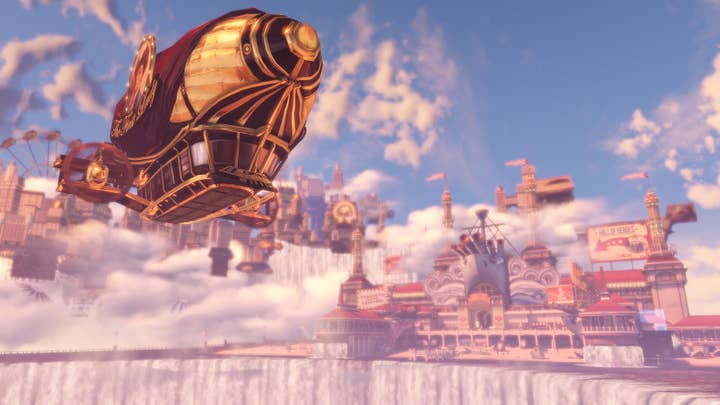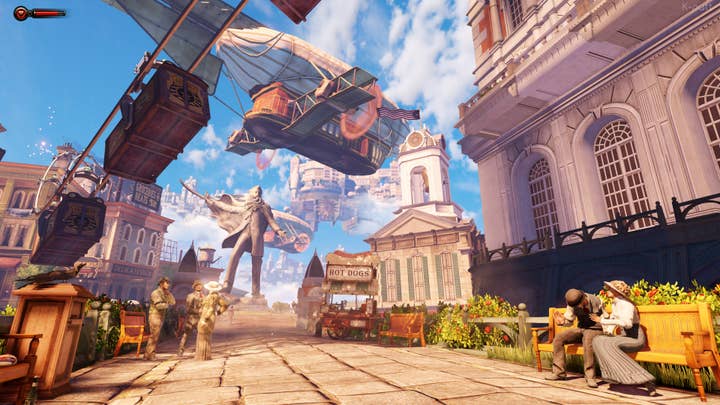Ken Levine: "You don't come up with amazing things by being completely normal"
At Gamelab Live, the founder of Ghost Story Games discussed the difficult balance between creativity and efficiency in game development
At Gamelab Live this week, veteran designer Ken Levine addressed the problem of balancing the realities of production against his own creative process. "It makes me strange," the founder of Irrational and Ghost Story Games said, "because I have to go to strange places."
Levine was talking to Mark Cerny, the architect of the PlayStation 5, about the evolving role of the creative director -- a job title with which Levine is closely associated, largely due to his work on the Bioshock series. While their conversation touched on a number of subjects, Levine was particularly keen to talk about the creative process, and specifically the arduous and intense side of generating unique ideas.
"When I get into a creative state, it can actually end up with me in a high state of anxiety," he said. "I have a problem with anxiety in general, but in order to really get creative I start revving the engine up, and I'll get on a run of having all of these really excessive thoughts.
"You have to really put yourself in the world of the game, because you can hold yourself back at a remove, but I [need to] get the engine going... and I realise I'm also super anxious by the time I get to this state. But I need to get to that stage so I can come up with ideas that are different, and will sound counterintuitive.
"If you don't have people at least saying 'that sounds a little insane,' you haven't gone close enough to the edge"
Levine added: "Sometimes I actually have to step back, and say: 'You need to cool the jets for a while, because it's gonna lead to other things. You're gonna start getting cranky, you're gonna start getting difficult, and annoyed at the people around you.' I learned that."
While these comments suggest that Levine's creative process has -- or once had -- the potential to create a negative environment, he posited that art is often made by people who embrace a "strange" part of themselves. He would apply that idea to himself, at least, though he acknowledged that not everyone would necessarily do the same.
"You don't come up with amazing things that nobody has ever said before by being completely normal," he continued. "You do it by being a little bit off, a little bit strange.... It makes me strange, because I have to go to strange places."
With a portfolio that includes pivotal roles on classics like System Shock 2, Bioshock and Bioshock Infinite, it's clear that Levine has managed to channel that process into great products. However, he emphasised the importance of people like Ghost Story Games' art director Shawn Robertson, who helps to process ideas that might otherwise seem -- in Levine's words -- "so out there."
"He'll work with me, and he'll try to turn it into something that's doable," Levine said of Robertson. "But if you don't have people at least saying 'that sounds a little insane,' you haven't gone close enough to the edge. Because the great stuff exists just at the edge of over the top.
"Sometimes you have to push past that point and make something outrageous and ridiculous, and then pull it back. But if you don't go to the outrageous and ridiculous, you don't know where that boundary is... You've got to go past it, and you'll tell people things and they're gonna look at you like you're insane. And then you bring it back to something you can actually accomplish."
Cerny admitted that, whenever he tries to think like a creative director, he tends to naturally shift back to the mindset of a producer -- engaged in the practical reality of the ideas being discussed.
"I've built up a little trust with Take-Two. They give me a little more leeway"
"I have an idea, but how much time is that gonna take? And are we staffed appropriately for it?" Cerny said. "These are terribly self-destructive activities, but the creative director... is supposed to have that bold, almost unachievable idea, and the rest of the team is supposed to be pulling the director back, and the director is supposed to be resisting it. That's kinda my image for how the great stuff gets made."
When asked by Cerny whether he has to "pull [himself] back from the cliff edge" or relies on his team to perform that function, Levine admitted that he is afforded a greater degree of freedom now than earlier in his career.
"I've built up a little trust with Take-Two," he said. "They give me a little more leeway."
Later in the session, Levine said that System Shock 2 was completed in the space of 14 months. "I never want to do that again," he said, while also acknowledging that the game was "something special" that came from a series of smart choices informed by severe limitations.

Certainly, even a brief glance at Levine's career proves that 14-month development cycles are unlikely to feature again anytime soon. Including Thief: The Dark Project in 1998 and Bioshock in 2007, he shipped seven games in nine years. Bioshock Infinite then took six years, and it is now 2020 and his next project remains unannounced. While there are mitigating factors -- including the dissolution of Irrational Games as a large studio, and its rebranding to Ghost Story Games with a smaller team -- it is close to seven years since Levine last released a product.
"You can save a lot of money by making not-great things, but then you're not saving any money"
However, Levine told Cerny that being given "an infinite amount of time" to make a game can be dangerous, because it leads to "a kind of paralysis" when it comes to making choices. "I never want a producer who says 'you can't do that,'" he added, but he makes sure to keep a team of people around him who can reinforce the pragmatic side of his creative choices.
"I'm also responsible for the financial health of the company... so I do wear a little bit of the producer's hat," he said. "I'm concerned about it, but I also know that if it's not great, it's not worth it. You can save a lot of money by making not-great things, but then you're not saving any money. You're going to lose a lot of money.
"How you figure that out -- that alchemy -- that's the job, right? That's the job. I don't have the skillset of a producer, but I'm always interested in what's expensive and what's cheap."
More than anything, though, every creative director needs to have enough awareness of the logistics of their choices to protect their team. As Levine pointed out, a long-winded and fruitless pursuit of a creative ideal can have a very real human cost.
"You've got people working on a product, and they've got their lives, and you don't want to make them work for years when it's unnecessary. They could be doing something else -- and yourself too. I'm 53 years-old. It's not like I have a thousand of these left in me.
"I take it seriously, but again, everything I release, if it's gonna take that much time and energy, I want it to at least have a chance of being something really cool. Just getting it out of the door is not essential."

